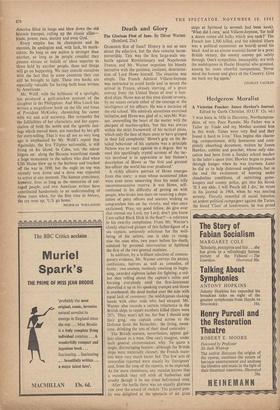Death and Glory
The Glorious First of June. By Oliver Warner. (Batsford, 21s.) The Glorious First of June. By Oliver Warner. (Batsford, 21s.)
GLORIOUS first of June? History is not so sure about the adjective, but the date remains incon-
trovertible. This was the first large-scale sea- battle against Revolutionary and Napoleonic France, and Mr. Warner organises his bloody narrative with the patience, coolness, determina- tion of Lord Howe himself. The situation was simple. The French Admiral Villaret-Joyeuse was instructed to avoid battle and to secure the arrival in France, already starving, of a grain convoy from the United States of over a hun- dred ships. 'Howe was at this time almost seventy, by no means certain either of the courage or the intelligence of his officers. He was a tactician of the old school. 'His admirals sometimes exercised initiative, and Howe was glad of it,' says Mr. War- ner, unravelling the heart of the matter with the sharpest of marline-spikes, 'but this was always within the strict framework of his tactical plans, which only the best of them seem to have grasped in their full complexity.' Howe's grip on the de- tailed behaviour of his captains was a principle Nelson was to react against to a degree. But to read this sparklingly crystal account of the tac- tics involved is to appreciate at last Nelson's description of Howe as 'the first and greatest Sea-officer the world has ever produced.'
A richly allusive portrait of Howe emerges from this story: a man whose occasional jokes were even more unnerving than his usual icily uncommunicative reserve. It was Howe, self- confessed in his difficulty of getting on with people, who broke into tears on receiving a depu- tation of petty officers and seamen wishing to congratulate him on the victory, and who once exclaimed, 'Pray, my good fellow, do give over that eternal my Lord, my Lord; don't you know I am called Black Dick in the fleet?'—a reference to his swarthy complexion. From Mr. Warner's closely observed picture of this father-figure of a sea captain, anxiously solicitous for the well- being of his sailors, one is able to recog- nise the man who, two years before his• death, subdued by personal intervention at Spithead the first of the two general mutinies.
In addition, by a brilliant selection of contem- porary evidence, Mr. Warner conveys the panics, confusions, horrors as well as comedies, of battle: two seamen, restlessly awaiting its begin- ning, awarded eighteen lashes for fighting; a red- hot shot rolling about the captain's cabin and burning everybody until the first-lieutenant shovelled it up in his speaking trumpet and threw it overboard; the dead hurled over the side with equal lack of ceremony; the midshipman shaking hands with other mids who had escaped. Mr. Warner also records a certain reluctance in the British ships to report numbers killed (there were 287). 'They won't tell me, for fear I should stop their grog,' one captain cried across to the Defence from the Invincible: the living, mean- time, drinking the tots of their dead comrades.
The British seamen, nevertheless, appear gal- lant almost to a man. One can't imagine, under such general circumstances, why. To quote a single, discouraging feature:. although the British ships were materially cleaner, the French mate- lots were very much better fed. The few acts of cowardice reported were mainly by 'foreigners' and, from the tone of the reports, to be expected. As for mere cleanliness, any matelot knows that a messdeck may still stink of barbarism and cruelty though it be ten times holystoned over.
After the battle there was an equally glorious row over the award of medals. The general pub- lic was delighted at the spectacle of six prize ships at Spithead (a seventh had been sunk). 'What did I care,' said Villaret-Joyeuse, 'for half a dozen rotten old hulks which you took?' The French lost 1,500 killed, and the admiral (there was a political commissar on board) saved his head. And as an almost essential factor in a great British victory, the enemy convoy got safely through. One's sympathies, inescapably, are with the midshipman in Haslar Hospital who groaned, among his more cheerful companions, 'Never mind the honour and glory of the Country. Give me back my leg again.'
CHARLES CAUSLEY










































 Previous page
Previous page